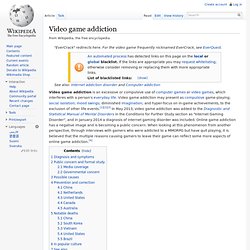

How to know if your child is addicted to video games and what to do about it. If your child spends long hours playing video games, you might be worried they’re addicted.

“Gaming disorder” is real, and has now been classified as a disease in the World Health Organisation’s International Classification of Diseases and Related Health Problems (ICD). The new ICD will be adopted in 2022. If you are worried about your child’s gaming, this new classification will help you identify whether they have a problem and if you need professional help. Gaming disorder is not just for kids – it can be experienced by gamers of all ages: children, teenagers and adults. The condition isn’t defined by gaming too much, or the number of hours played, but rather it’s when gaming interferes with a person’s daily life. Read more: I WANT MY iPAD! To be diagnosed, a person will demonstrate all three of the following symptoms for at least 12 months: It also relates to gaming on any device, although most people who develop clinically significant gaming problems play primarily on the internet. Gamers suggest ways to combat addiction.
Image copyright Parliamentlive.tv Gaming "addicts" have been talking to MPs about the dangers of spending too much time online.

One told them that parents should set a three-hour-a-day limit on their children's gaming. It is part of an inquiry into technology addiction, being held by the Digital, Culture, Media and Sport Select Committee. At an earlier hearing, representatives from the gaming industry downplayed the issue. There is no publicly available content from that meeting but, in written evidence to the committee, the association for UK Interactive Entertainment (Ukie) said there was a "lack of evidence" around the concept of gaming addiction, citing both a UN report and one from the Royal College of Paediatrics and Child Health.
It also told MPs gameplay could be a "force for good". "We believe that games can provide educational, physiological, psychological, recreational and social benefits to players," it said. "Games provide rich story worlds, creative canvasses. College crash. Video game addiction. Video game addiction is an excessive or compulsive use of computer games or video games, which interferes with a person's everyday life.

Video game addiction may present as compulsive game-playing; social isolation; mood swings; diminished imagination; and hyper-focus on in-game achievements, to the exclusion of other life events.[1][2][3] In May 2013, video game addiction was added to the Diagnostic and Statistical Manual of Mental Disorders in the Conditions for Further Study section as "Internet Gaming Disorder", and in January 2014 a diagnosis of internet gaming disorder was included.
Online game addiction has a negative image and is becoming a public concern. When looking at this phenomenon from another perspective, through interviews with gamers who were addicted to a MMORPG but have quit playing, it is believed that the multiple reasons causing gamers to leave their game can reflect some more aspects of online game addiction.[4] Diagnosis and symptoms[edit] Pre-occupation.
Dr. Video Games Stronger Than Morphine: U.S. Military. Video Games: An Hour A Day Is Key To Success In Life. The single biggest misconception about games is that they’re an escapist waste of time.

But more than a decade’s worth of scientific research shows that gaming is actually one of the most productive ways we can spend time. No, playing games doesn’t help the GDP - our traditional measure of productivity. But games help us produce something more important than economic bottom line: powerful emotions and social relationships that can change our lives—and potentially help us change the world. Currently there are more than half a billion people worldwide playing online games at least an hour a day — and 183 million in the US alone. The younger you are, the more likely you are to be a gamer — 97% of boys under 18 and 94% of girls under 18 report playing videogames regularly. Why are we increasingly turning to games?
That’s what I mean when I say — in the title of my new book — that Reality is Broken.” Fortunately, however, this temporary exodus is not a complete waste of time! Video Games. eGaming. Digital Addiction.